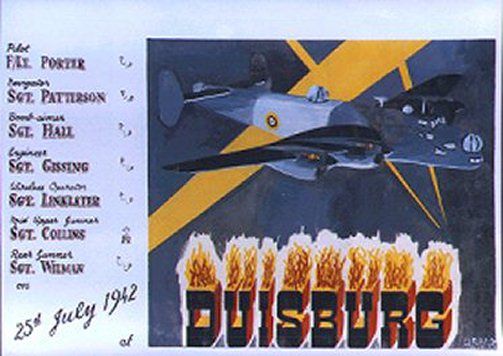 |
|
 |
 |
|
 |
I had only been in camp a few weeks when one morning there was a flurry of
excitement and someone said there were Canadian soldiers in the compound
immediately North of ours. They had arrived during the night. It was the
majority of the chaps from Dieppe. I recall Win Parker, knowing one of these
fellows from the pre-war days. Win was from Millarvilie. After a short while the
Dieppe soldiers were moved to the compound across from ours. The forest was on
the other side of them, they were abutted against the outer perimeter wire and
the sentry boxes. We were able to visit during the day, when the gates were
open, and I became good friends with Andy Nyman, Ken Smethurst, Dennis Scott and
"Shorty" Richards. They were from the Calgary Tanks, Red Deer and vicinity.
I
became used to the camp routine. Of course it took a while to get used to being
hungry all the time and disciplining yourself to spin out your Red Cross food,
it was a great help being in a combine with communal sharing. It was still warm
so being cold was not yet a problem, Red Cross parcels were coming in and the
soups were good. It was probably the best time of the year to be in a Stalag.
After a couple of months I got a parcel from home which included a pair of
pyjamas. They were great, as your bareskin was not on the course blankets and
one could also catch the fleas between your skin and the pyjamas. Then you could
crack them between your thumb nails. Soon your pyjamas were spotted where the
fleas had been killed.
Late in autumn the German's claimed that some of
their soldiers had been found after the Dieppe Raid with their hands tied behind
their backs and shot. The Canadians claimed this was untrue and propaganda.
However, the Germans wanted retaliation so they tied up the Dieppe men, but they
claimed these were not enough Dieppe soldiers so they tied up everyone in the
R.A.F. compound as well. This was an ordeal because Red Cross string (like
twine) was used. Your hands were crossed in front of you and tied very securely.
If they were too tight you could go to a German officer who had them loosened,
then the blood was able to circulate again. The German soldiers who first tied
us up were from the Russian front and they went back home for rest and training.
They were first class men, when we complained to them they said that it was a
terrible thing the Canadians had done to shoot their comrades, when they were
POW5 and to have tied them up before hand. It did no good to argue that this was
false since they believed their propaganda.
We were tied up quite early
in the day, then untied to eat our noon soup and use the forty holer. Then after
a bit tied up again until evening. We were not allowed to lie on our bunks and
there was not enough room for everyone to sit at the bench tables. And even if
you could you couldn't play cards, write, etc. with your hands tied up. Walking
was possible but awkward, as it was getting cold and we didn't have our coats
on, so walking was a little colder than standing around in the barracks. If a
guard found out that you had managed to loosen the string you were sent to a
empty barrack in the Dieppe compound. Your hands were tied behind your back and
you had to stand an hour or two facing a wall. After a couple of these ordeals I
did not loosen the string again.
We were all untied on Christmas day and the
guards were not out in force. I recall lying in my bunk and hearing Christmas
Carols coming from the wash area in between the two ends of the barrack block.
This was around 7:00 a.m. A Corporal Lawrence, R.A.F. had organized and trained
a choir and they were following an Old English custom of singing carols early on
Christmas day. They had gone into the wash area by opening the blackout
shutters, then going through the broken windows. Their efforts were greatly
appreciate and it certainly tugged on the heart strings. We had managed to hoard
some of our rations, and the Germans issued a good soup, extra potatoes and some
Wurst sausage. It was a day to enjoy. The next day it was back to the string,
etc. One thing I poignantly recall was as the day wore on and you felt at the
end of your tether, we would start to sing familiar songs for an hour or so
until we were untied for the day. Luckily the R.A.F. chaps were used to communal
singing in pubs and barracks, etc., so they lead the way. I recall some the
R.A.F. regulars who had been in service for many years before the war. On their
tours in the Far East, Middle East, etc. some of them had developed great story
telling skills and they could sing parodies of various songs and events for
hours on end. This was after lights out. A Sgt. Gibson "Gibby from East Anglia
was the best.
I believe it was soon into the New Year that tying us up
with string was discontinued, the number of guards greatly reduced and we were
handcuffed. These handcuffs were easily removed and with less supervision, life
was much more tolerable. I recall the period of being tied up as a very grim and
trying ordeal.
 Previous Section |
 Go Back to Chapter Headings |
 Next Section |